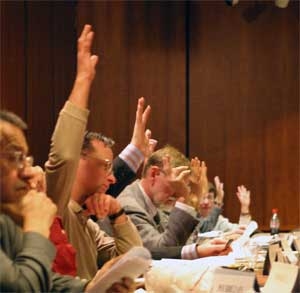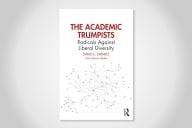You have /5 articles left.
Sign up for a free account or log in.

Kara Kronenweter for the Drexel Triangle
Should elected members of faculty bodies be able to cast their votes by secret ballot? Faculty senators at the University of Kansas recently reviewed a provision allowing for that option, ultimately deciding to preserve it. But some faculty members are unhappy with that result.
“Elected representatives should be doing this out in the open,” said Michael Williams, a professor of journalism and a first-term senator. “Even if my colleagues happen to dislike or disagree with my vote, they should know how I voted. I just don’t think this is something that should be happening in an elected body.”
Before 2012, Kansas’ Faculty Senate had no specific policy on secret voting, which was rarely used. When necessary, it deferred to Robert's Rules of Order on the matter. That commonly referenced set of parliamentary procedures allows for secret ballot votes when a voter’s “true sentiments” are more likely to be expressed anonymously. The measure to go to a secret ballot must be approved by a majority first, in an open vote.
The issue came to the fore, however, in March 2012, when some faculty invoked the secret ballot provision during a contentious personnel case involving a professor who was denied tenure. Some senators said they worried that a video recording of the meeting the professor’s supporters were making would lead to reprisal for their votes. The vote was taken in secret, according to Robert's Rules.
Following that vote, Chris Crandall, a professor of social psychology who was in the Faculty Senate at the time, said the professors’ supporters criticized the Senate for invoking the measure, and reported the Senate to the county prosecutor for an alleged misdemeanor crime.
So the following year, as president of the University Senate, a body that includes faculty, staff and students, Crandall said he and other leaders sought to at once clarify the legality of the measure and make it harder to invoke. He proposed a regulation to be added to the Senate bylaws requiring a two-thirds majority vote in favor of a secret-ballot vote.
"On rare occasions, voting by private ballot is permitted upon the approval of two-thirds of the members present and voting,” read the proposed language, which was adopted by both the Faculty Senate and the University Senate.
“In the nearly two years since the sentence was adopted, there has been no ballot voting (with the exception of yearly voting for officers, which has always been by ballot),” he said in an email.
Nevertheless, a petition surfaced this year calling for the provision to be repealed. In a two-thirds vote, however, the language was upheld. Secret ballot voting was preserved.
A similar vote in the University Senate, which includes staff, ended in the same result.
Williams said he was surprised by the wide margin by which the measure passed, arguing that it would never be acceptable for members of Congress, for example, to vote in secret, as they’re accountable to their constituents. And while he had some sympathy for staff members in the University Senate who might fear for their jobs after voting for an unpopular position, he said, tenure protected many faculty senators from such a threat.
Crandall called positions such as Williams’s “principled.” But he said reprisal is a real threat, and protections should be afforded to those who volunteer their time to serve in shared governance bodies.
The extent to which one is bothered by such a policy might be colored by his or her level of cynicism toward faculty politics, he added. “If you trust the Faculty Senate to behave well, then ballot voting is hardly much of an issue. On the other hand, if you are already deeply suspicious of the Faculty Senate (a body with very limited ability to make changes on its own, but is primarily a consultative body with the power allowed it by the administration), then ballot voting will only deepen that suspicion.”
It’s unclear how many universities have this policy written into faculty bodies' constitutions. The American Association of University Professors doesn’t track the issue, and doesn’t offer recommended best practices.
Greg Scholtz, director of tenure, academic freedom and governance at AAUP, said most faculty handbooks and senate bylaws he’d reviewed name Robert's Rules as the parliamentary authority. Personally, he added, at his former institution, Wartburg College, “most” important faculty votes were handled by secret ballot, presumably for the same reasons as at Kansas.
Some faculty senates' votes are de facto anonymous. Pennsylvania State University is among those institutions whose faculty senate members vote by a clicker that digitally logs their votes in plenary meetings; clickers are given out randomly and do not record individual senators' votes. Penn State doesn’t use them exclusively, however. Sometimes a show of hands or a voice vote is used. In shows of hands, those not there and not watching wouldn't know for sure how someone had vote, although the vote is nominally public.
Larry Backer, a professor of law at Penn State and immediate past president of its Faculty Senate, who writes a blog on governance, said he’d changed his mind about anonymous voting over the past several years. Depending on the context, he said, “I am now a bigger fan.”
“For important votes that may be sensitive or on major Senate work, I think anonymous voting is appropriate, especially after substantial debate and effective engagement of the Senate community,” he said via email. “The principal reason is the most obvious -- anonymous voting reduces pressure on faculty, and especially contract faculty -- to perform for administrators and Senate leaders. And it may reduce fear of retaliation for voting ‘against’ the administrative position.”
At the same time, he said, “anonymous voting also makes accountability harder. How does a unit decide whether to re-elect a senator if that unit cannot tell how that senator voted on matters of importance to the unit?” In any case, Backer added, "these issues deserve substantially more discussion than they currently receive."
Matthew Woessner, an associate professor of political science at Penn State’s Harrisburg campus who is also part of the Faculty Senate, has been involved in recent conversations about governance there, in light of a controversial new health care plan for faculty. He said he was of two minds about the practice.
On one hand, it would never be acceptable for legislators to vote in private, Woessner said. On the other, the integrity of individual voters’ votes rests in anonymity, in that they can’t be bought or sold. And he questioned the argument some open-vote advocates have made, that even professors voting unpopular positions are protected by tenure. Some elected faculty representatives don't yet have tenure, and others with tenure might be hoping for a promotion.
Essentially, he said, it comes down to two “competing philosophies.”
Cathy Trower, a part-time governance consultant for nonprofit boards and outgoing director of research for the Collaborative on Academic Careers in Higher Education at Harvard University, said she tended to favor a secret ballot policy on contentious issues. Such votes might be more likely to result in decisions that are good for the university as a whole, she said. In open votes on contentious issues, "What I worry about is that everyone knows how everyone votes, but you don't know how everybody thought. Did they vote in their own best interest, as opposed to in the interest of the institution?"
Perhaps more important than procedures, she added, is that important votes take place only after thorough discussion.
"This has implications for the board room, too," Trower said. "I'm in favor of the board room airing all sides of the issue and critically debating the issue, and letting people vote only after they've thought about multiple sides. Otherwise they're likely to vote a preconceived idea. We all get entrenched in that. Even thought we think we're open-minded, we really aren't."









